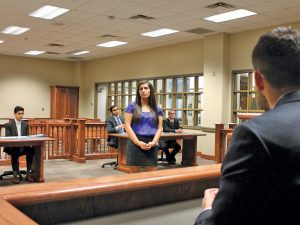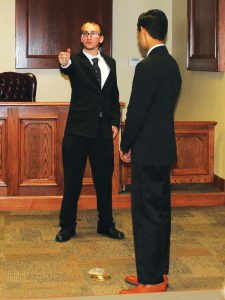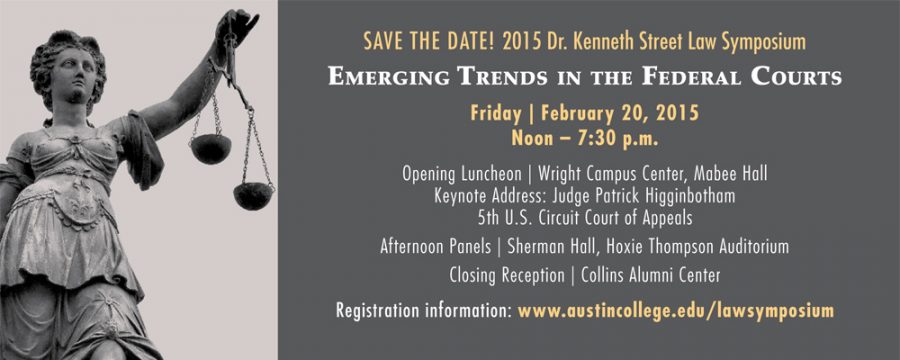 Visitors to Abell Library may think they have taken a wrong turn, suddenly finding themselves not among books, journals, or computers but in an authentic courtroom. Just off the foyer is a courtroom complete with the judge’s bench, witness stand, attorney tables, jury box, and a gallery for spectators—home to the College’s new Advocacy programs and a laboratory for students to explore moot court, mediation, and mock trial.
Visitors to Abell Library may think they have taken a wrong turn, suddenly finding themselves not among books, journals, or computers but in an authentic courtroom. Just off the foyer is a courtroom complete with the judge’s bench, witness stand, attorney tables, jury box, and a gallery for spectators—home to the College’s new Advocacy programs and a laboratory for students to explore moot court, mediation, and mock trial.
Students have jumped into the mock trial and mediation programs with great interest this fall, and already have participated—with good results—in competitions in Texas, Arizona, and Georgia. Michael Gunnin, who joined the College in July as director of special academic programming, is guiding the teams. He has good experience—having helped expand the pre-law program at UTDallas and coached its mock trial and mediation teams to national recognition. A graduate of Yale University, he earned a degree at The University of Texas School of Law and practiced law before moving back into academics.
Gunnin is pleased with the results of the student work, saying they have done amazingly well in a short time—and competitors have been surprised that they are new teams. Ten students have taken part in mock trial tournaments, and another group has participated in mediation competition. In mock trial, students portray attorneys and witnesses, with one party suing another. In August, the teams received a 160-page packet for preparation—and present that case at each competition. This year, the case is a civil one, so next year, the teams will be involved in a criminal case. Mediation competitions simulate the growing trend of settlement of conflicts outside the courtroom (sometimes court-ordered). Competition involves a client, advocate, and mediator, with members cycling through the various roles. Moot court, which involves two attorneys arguing points of law before the Supreme Court, is in development this year with plans to compete next year. Participants must have taken a course that includes case law.
 The teams meet each week in a four-hour session, practicing their skills on the witness stand and from the attorney table. Zayra Acosta ’16 competes in mock trial and mediation. Until recently, she hadn’t even considered a career in law so finds the program a “blessing” since it has helped her refine her career choices. She now plans to attend law school and obtain a mediator license.
The teams meet each week in a four-hour session, practicing their skills on the witness stand and from the attorney table. Zayra Acosta ’16 competes in mock trial and mediation. Until recently, she hadn’t even considered a career in law so finds the program a “blessing” since it has helped her refine her career choices. She now plans to attend law school and obtain a mediator license.
The Advocacy program teaches critical thinking and presentation skills useful to all students, regardless of major or career aspirations. For students considering law, the process does teach them about trial advocacy and the rules of evidence. “This program won’t help students get into law school, but once there, they will find the experience to be beneficial,” Gunnin said, explaining that alumni who have done Advocacy programs report they have more confidence and general understanding once they are in law school.
For Zayra. the program also has provided new knowledge, new friends, and new opportunities. She particularly enjoys being part of a team that “practices for fun what we want to do for the rest of our lives.” The hard work, she said, is “definitely worth the investment.” Too, she has had experience performing, and says competition is like performing, and the courtroom provides a stage.
The Austin College program will host a mock trial competition January 17-18, 2015. Any law alumni wishing to help with judging the competition should contact Michael Gunnin at 903.813.2760.
Zayra Acosta—Jesse H. Jones and Mary Gibbs Jones Endowed Scholarship
See more information about the 2015 Dr. Kenneth Street Law Symposium

